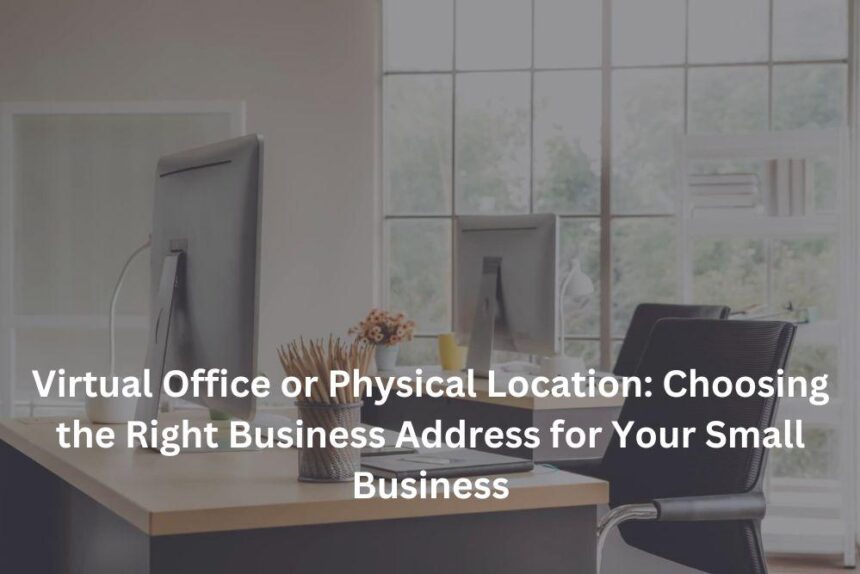In today’s dynamic business world, entrepreneurs have a critical choice of deciding whether a virtual office or a physical location will suit their business.
As businesses reassess their workspace needs, it is important for business owners to weigh the pros and cons of the two office setup to know which one will work best for their business needs.
In this article, we will highlight options for you when deciding between a physical office and a virtual address for your business, their similarities, and differences. a growing number of entrepreneurs are exploring options such as a virtual office in Mumbai, which offers them a credible business address in a prime commercial hub without the need to rent or maintain physical space.
Virtual office vs a physical office, what are they?
A virtual office is an address that can be used to register a business or a director’s correspondence address.Virtual office providers give a professional company address that businesses can use for official correspondence and marketing.
A physical office refers to a business environment that is confined to a single building or a commercial property. This building is mainly involved in the running of company business, management, and planning among other things. To specify, a real office facilitates you to work in a structured environment, in person interactions among coworkers, and serve clients/customers.
A virtual address provides the flexibility and scalability to operate from anywhere while keeping a professional public image, whether it is a start-up, small, or large business.
Rent, utilities, and upkeep are all expenditures associated with operating a physical office.
What are the features of a virtual office?
Professional business address: You get a legitimate business address that can serve as your official company location even if you are operating from the comfort of your home or a hotel.
Mail handling: Through the professional address, your business can receive mail and packages. Your virtual office address London service provider will hold your mail and forward it to your personal mailing address. Urgent letters can be scanned and emailed to you if required.
Virtual Receptionist & Call Answering: Access to business phone numbers that forward calls to your devices. Virtual receptionists can manage and handle calls, emails, and chat conversations on your behalf.
What are the similarities of a virtual office and a physical location?
Professional image
Both a physical location and a virtual office offer a professional image to your business. A physical office provides a tangible location for your business offering credibility and trust to your clients and partners.
Virtual offices offer a professional address for businesses that will enhance their professional image without the need for a physical workspace.
Local independence
Both virtual offices and physical offices offer flexibility in terms of location.
In a virtual office, you can work from anywhere with an internet connection, such as at home, coffee shops, or while traveling.
Physical offices, on the other hand, have a fixed location where employees come together daily.
Cost Savings
Both models can lead to cost savings.
Virtual offices eliminate the need for physical office space, reducing rent, utilities, and office supplies costs.
Physical offices may have higher overhead costs but offer a dedicated workspace for collaboration.
Community and Collaboration
While virtual offices promote remote work, they also emphasize community and collaboration through virtual interactions.
A physical office offers in-person interactions where employees can collaborate easily fostering productivity, creativity, teamwork, and problem-solving.
What are the differences between a virtual office and a physical location?
Networking opportunities:
When in an office space, especially in a shared office, you are exposed to other professionals with whom you can share different ideas. It is also easier for potential clients to walk in at your office and close a deal.
A virtual office has less in-person collaboration.
Professional setup for client meetings
It is easier to have a meeting with clients, partners, or investors anytime in a physical office setup. It is easier to do presentations without being worried about time management.
Virtual offices can set up their meetings online which might be distracted with an internet connection.
Cost
Having a physical office space means leases, rent, office furniture, maintenance, and utility bills which can be a lot if you are a start-up.
Virtual offices are substantially cheaper than physical office space. With a virtual office, you will cut costs on rent, utility bills, and administrative costs. Many virtual office service providers may include the cost of virtual assistants and receptionists in their packages which is cheaper than hiring employees.
Flexibility
Physical locations are less flexible and scalable. Businesses will be tied to one physical location limiting their flexibility and scalability. It may be expensive to scale up your business.
Your business can operate from anywhere and still maintain a professional image with a virtual address. If your business is expanding, it is easy to purchase a virtual address in a location of your choice and expand your business affordably. If your business is struggling, you can end your virtual office contract at any time.
Staff convenience
Virtual offices give staff convenience of working from the comfort of their home.It eliminates the need for employees to commute daily, reducing traffic which positively affects the environment.
Whereas, employees working in a physical office space are required to commute to a fixed location every working day.
Life and work balance
A dedicated workspace outside your home helps maintain work-life boundaries.
How do I decide which one is right for my business?
Budget: Before choosing whether to set up your business physically or virtually, consider the budget of your business.
Business activity: Depending on the nature of your work, determine if your business is suited for a virtual office or a physical space. Businesses that heavily rely on physical products or are involved in manufacturing or production may need physical spaces for storage and inventory.
Scalability: Consider a setup that will allow your business to expand without constraint. A physical office space ties your business to one physical space and location and in case of expansion, it may cost you to rent another office space, equipment, and infrastructure.
Flexibility: Considering your nature of business, choose a business model that will offer flexibility such as a virtual address.
Collaboration: If your business highly depends on networking and collaboration, consider a business model that will offer in-person interactions such as a physical office space.
In conclusion, the decision to go for a virtual office or a physical location depends on the business needs and considerations. Virtual offices give employees flexibility with less expense while physical offices provide a typical work environment structures that allow for affiliation and in person interaction.
BusinAssist provides virtual office services to all the UK businesses and the businesses based in other countries. They have a wide range of locations for virtual business addresses to choose from and these are virtual office Mayfair, central London, east London, Essex, Scotland and northern Ireland.
They are provided with mail-handling services and other benefits related to business support services. Any more details about this may be sought from them at info@businassist.com.


